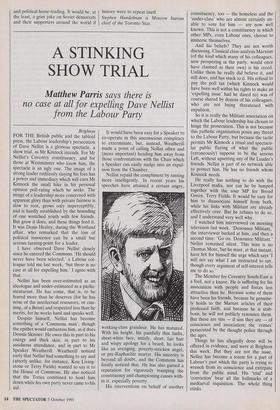A STINKING SHOW TRIAL
Matthew Parris says there is
no case at all for expelling Dave Nellist from the Labour Party
Brighton FOR THE British public and the tabloid press, the Labour leadership's persecution of Dave Nellist is a glorious spectacle, a show trial, as Mr Kinnock intends. For Mr Nellist's Coventry constituency, and for those at Westminster who know him, the spectacle is an ugly one. The image of a strong leader ruthlessly slaying his foes has a power and immediacy which will earn Mr Kinnock the small hike in his personal opinion poll-rating which he seeks. The image of a leadership more concerned with apparent glory than with private fairness is slow to root, grows only imperceptibly, and is hardly established by the hounding of one wretched youth with few friends. But grow it does, and these things feed it. It was Denis Healey, during the Westland affair, who remarked that the loss of political innocence can be a small but serious turning-point for a leader.
I have observed Dave Nellist closely since he entered the Commons. 'He should never have been selected,' a Labour col- league told me last week, tut there is no case at all for expelling him.' I agree with that.
Nellist has been over-estimated as an ideologue and under-estimated as a parlia- mentarian. He has come, that is, to be feared more than he deserves (for he has none of the intellectual resources, or cun- ning, of a Benn) and respected less than he merits, for he works hard and speaks well.
Despite himself, Nellist has become something of a 'Commons man', though the epithet would embarrass him, as it does Dennis Skinner. He owes this in part to his energy and thick skin, in part to his assiduous attendance, and in part to Mr Speaker Weatherill. Weatherill noticed early that Nellist had something to say and (utterly unlike, for instance, Ken Living- stone or Terry Fields) wanted to say it to the House of Commons. He also noticed that the Tories combined to howl him down while his own party never came to his aid. It would have been easy for a Speaker to co-operate in this unconscious conspiracy to exterminate, but, instead, Weatherill made a point of calling Nellist often and (more important) heading him away from those confrontations with the Chair which a Speaker can easily nudge into an expul- sion from the Chamber.
Nellist repaid the compliment by ranting more intelligently. In recent years his speeches have attained a certain angry, working-class grandeur. He has matured. With his height, his painfully thin limbs, sheet-white face, untidy, short, fair hair and wispy apology for a beard, he looks like an avenging, poverty-stricken angel, or pre-Raphaelite martyr. His sincerity is beyond all doubt, and the Commons has finally noticed that. He has also gained a reputation for vigorously tramping the constituency and championing causes with- in it, especially poverty.
His interventions on behalf of another constituency, too — the homeless and the 'under-class' who are almost certainly un- able to vote for him — are now well known. This is not a constituency in which other MPs, even Labour ones, choose to immerse themselves.
And his beliefs? They are not worth discussing. Classical class-analysis Marxism (of the kind which many of his colleagues, now prospering in the party, would once have claimed as their own) is his creed. Unlike them he really did believe it, and still does, and has stuck to it. His refusal to pay the poll tax (which Kinnock would have been well within his rights to make an 'expelling issue' had he dared to) was of course shared by dozens of his colleagues, who are not being threatened with expulsion.
So it is really the Militant association on which the Labour leadership has chosen to hinge the prosecution. This is not because this pathetic organisation poses any threat to the Labour Party, but because the tactic permits Mr Kinnock a ritual and spectacu- lar public flaying of what the public (erroneously) suppose to be the serious Left, without upsetting any of the Leader's friends. Nellist is part of no network able to protect him. He has no friends whom Kinnock needs.
He really has nothing to do with the Liverpool mafia, nor can he be lumped together with the sour MP for Broad Green, Terry Fields. It would be easy for him to disassociate himself from both, while his links with Militant are already effectively over. But he refuses to do so, and I understand very well why.
I watched him interviewed on morning television last week. 'Denounce Militant,' the interviewer barked at him, and then a second time: 'Go on. Denounce Militant.' Nellist remained silent. This man is no Thomas More, but he must, at that instant, have felt for himself the urge which says 'I will not say what I am instructed to say, though every argument of self-interest tells me to do so.'
The Member for Coventry South-East is a fool, not a knave. He is suffering for his association with people and forces less attractive than he. Because some of them have been his friends, because he genuine- ly holds to the Marxist articles of their professed faith, and because he is stub- born, he will not publicly renounce them.
But these are sins — if sins they are — of conscience and association; the 'crimes' persecuted by the thought police through the ages.
Things he has allegedly done will be offered in evidence, and were at Brighton this week. But they are not the issue.
Nellist has become a totem for a part of Labour's past which the party is trying to wrench from its conscience and extirpate from the public mind. His 'trial' and 'conviction' bear all the hallmarks of a mediaeval inquisition. The whole thing stinks.


















































 Previous page
Previous page